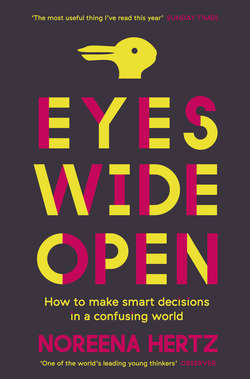Читать книгу Eyes Wide Open: How to Make Smart Decisions in a Confusing World - Noreena Hertz - Страница 32
The Trouble with Wayne
ОглавлениеWhen 238 university psychologists were asked to rate the CVs of two fictitious applicants for an academic tenure-track job, from a Dr ‘Karen’ Miller and a Dr ‘Brian’ Miller, the results were pretty disappointing for anyone who cares about gender equality.6
Although the two CVs were identical apart from the first name, the male Dr Miller was perceived to have better research, teaching and service experience than the female Dr Miller. While three-quarters of the psychologists would have recommended hiring Dr Brian, less than half would have hired Dr Karen. And it wasn’t just male professors who thought this: female professors were just as guilty.
It may be easy simply to put this down to gender bias, but other studies have also found that the way something is named affects how it is perceived. During the dotcom bubble, for example, many firms changed their names to take advantage of the euphoria surrounding ‘hot dotcom’ stocks.7 These included some that had nothing to do with the internet. For example, North American Natural Inc., which was in the business of producing educational literature, changed its name to Pinkmonkey.com, and saw its share price increase from $1 to $17. In another startling example of the influence a name can have, RLD Enterprises, a potato-crisp manufacturer, changed its name to go-rachels.com and experienced a huge jump in the value of its shares, even though at the time of the name change go-rachels did not even have a website.
Just by changing their names, these companies experienced large increases in their stock prices without any underlying business change. Time-poor investors were heavily influenced by the tremendous optimism about everything associated with the internet at the time, and used companies’ names as a short cut on the basis of which to make important financial decisions.8
Shakespeare was wrong. A rose by any other name, it seems, does not smell as sweet. In fact, this is literally true: researchers in Montreal found that subjects enjoyed smells more when they had more pleasant names. ‘A rose by the name of “rotting flower” would not smell as sweet as if it were introduced as “fresh rose”,’ the study concluded.9
Remember all this when you’re leafing through a pile of CVs, choosing what to buy for dinner in a supermarket, or deciding who to vote for. Or indeed if you are a doctor diagnosing patients. A British study told two groups of psychiatrists the same story about a young man who had attacked a train conductor. The only difference was the attacker’s name. When it was ‘Matthew’, psychiatrists were more likely to diagnose him with schizophrenia; when it was ‘Wayne’, they were more likely to diagnose him with a personality disorder or a drug problem.10
This may seem surprising, or shocking, but time and time again studies have shown that anything, from a single pernicious word to a scientific-sounding formula, from a company’s name to that of a person, can fundamentally affect the way we process information and choose what to do.
So, whether you’re someone who thinks of yourself as a measured decision-maker, or as more of a gut thinker, be aware that such semantic factors may be what is actually driving your decisions.
World-weary and supposedly savvy, we may all think we are well attuned to these linguistic attacks on our ability to think and decide, but the truth is that we remain acutely vulnerable, whether in the supermarket aisle or the polling booth, whether sitting in the classroom, the office or the courtroom.
